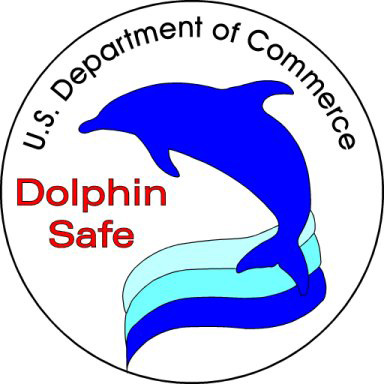- Blog
- Climate & Energy Justice
- Keep the Dolphin Safe tuna label safe!
Keep the Dolphin Safe tuna label safe!

Donate Now!
Your contribution will benefit Friends of the Earth.
Stay Informed
Thanks for your interest in Friends of the Earth. You can find information about us and get in touch the following ways:
One of the best-known and trusted environmental labels is the “dolphin-safe” label that today can be found on much of the tuna sold in the U.S. On May 16, a World Trade Organization appeals panel ruled that this label unfairly discriminates against Mexican tuna fishers, and violates international trade law. Now, the U.S. is likely faced with the choice of either rolling back its standards or face possible trade sanctions from Mexico.
Mexican fishing ships find tuna by following dolphins that swim with tuna. The ships use dangerous purse seine nets that encircle both the dolphins and tuna. Mothers and calves can be separated. Lactating females can be killed. This is not a trivial issue: the dolphins’ reproductive success is threatened by these practices, and simply placing observers on ships, as is now the Mexican practice, is not an adequate safeguard. There can be some serious but unobserved side effects, such as severe stress on dolphins caused by repeated chase-downs, encirclement and entanglement in nets
After years of effort by consumer and environmental advocates, United States in the 1990s developed “dolphin safe” labels for tuna packaging, so that consumers can choose to buy tuna that is not harvested using nets that kill dolphins by the multitude. Many Mexican commercial fishing operations refuse to abide by these “dolphin safe” practices. As a result, in 2008 Mexico sued the United States before a WTO tribunal, where commercial values are given far greater weight than environmental values In September 2011, Mexico won the case, but the U.S. appealed. On May 16, the WTO Appellate Body ruled against the United States, and its ruling was even worse than the lower tribunal decision in terms of legal consequences.
The members of the initial tribunal determined that the U.S. voluntary system of dolphin-safe labeling for tuna packaging was only “more trade-restrictive than necessary.” This suggested that some other system might pass muster. In other words, the September decision implied that providing consumers with such information could be a legitimate government objective – although it is astonishing that WTO law allows the legitimacy of such basic governmental functions to be questioned in this way.
The WTO Appellate Body adopted the view that the U.S. dolphin safe tuna labeling program was discriminatory. This is nonsense given that the U.S. program treats imported and domestic tuna exactly the same – no matter where the tuna is caught, it is subject to the exact same labeling standards. The U.S. labeling system does not ban tuna from Mexico; in fact Mexican-caught tuna can still be sold in the U.S. without the dolphin-safe label.
But instead of letting consumers “vote with their dollars” to persuade Mexican tuna fishers to change their harmful ways, the U.S. now must contemplate weakening our own standards. To make matters worse, this is not an isolated international trade tribunal ruling, nor is it an unusual problem resulting from international trade and investment agreements. The WTO pact, NAFTA and subsequent trade agreements are binding on the United States and contain many provisions that put the profits of multinational corporations ahead of the public interest and the environment.
Despite the fact that at this very moment these trade agreement provisions are harming the ability of the United States to protect the environment, the U.S. is pushing for a new trade deal called the Trans Pacific Partnership – and is keeping the negotiating text secret. The secret TPP text no doubt contains language that is intended to facilitate international legal challenges to environmental laws. Or, as in the case of the WTO litigation on dolphin safe tuna labeling, the TPP text may contain language that the U.S. trade representative does not intend to result in successful challenges to environmental laws, but is so loosely drafted as to have that result. The U.S. trade representative must release the TPP negotiating text so that the public can identify its intended and unintended consequences for environmental policy.
